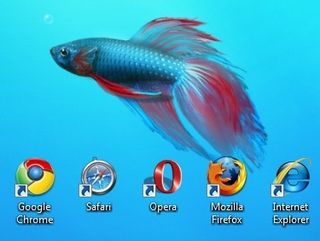Will Windows 7 decide browser wars?
Expert opinion on the Internet Explorer arguments

With the browser battle being waged in the EC courtroom, the arrival of Windows 7 on the horizon and Firefox pushing for a quarter of the global market, it's certainly interesting times for the way in which people access the internet.
The European Commission has brought an antitrust case against Microsoft, claiming that the company's 'tying of Internet Explorer to the Windows operating system harms competition between web browsers, undermines product innovation and ultimately reduces consumer choice'.
It's a stance that Mozilla, the open-source alliance behind Firefox, agrees with, along with the original complainant Opera.
"In my mind, there is absolutely no doubt that the statement above is correct. Not the single smallest iota of doubt," blogged Mozilla's Mitchell Baker.
"I've been involved in building and shipping web browsers continuously since before Microsoft started developing IE, and the damage Microsoft has done to competition, innovation, and the pace of the web development itself is both glaring and ongoing."
Dogged by controversy
Regardless of the case, controversy and Internet Explorer have gone hand in hand virtually since its inception.
Get daily insight, inspiration and deals in your inbox
Get the hottest deals available in your inbox plus news, reviews, opinion, analysis and more from the TechRadar team.
The battle with Netscape Navigator really hit the headlines back in the late 1990s, and yet it still colours many people's opinion of Microsoft and its treatment of rivals; the latest anti-trust case is merely the latest chapter in the ongoing saga.
"Microsoft also promoted IE through activities that the US Department of Justice and the US Courts determined to be illegal," adds Baker.
"As result, Internet Explorer ended up with well over 90 per cent market share. Once this happened, Microsoft stopped browser development; even disbanding its browser team."
If you looked purely at the figures you would be inclined to suggest that Microsoft is already losing its grip on the browser market, with Firefox's steady encroachment clear and the likes of Opera, Apple's Safari and Google's newcomer Chrome all taking a significant share.
And yet, the Windows 7 beta has suggested that Microsoft has a big win on the operating system front arriving – and the arrival of a popular new OS throws a whole new spanner in the works.
Why? Because Windows 7 will almost certainly come with Internet Explorer 8 as its default, and millions of people will face a decision of using a much-improved Microsoft browser in IE8 or going to the trouble of downloading any other internet software they used previously, be it Firefox, Opera or something else.
"You're now looking at a much stronger offering in IE8," Forrester's Principal Analyst Paul Jackson told TechRadar, "one that's tied slightly more into the OS.
"What the EU thinks of that remains to be seen, but I think that you will be looking at a re-invigorated browser market when Windows 7 comes out."
IE8 a stronger proposition
The argument is that people will find Internet Explorer 8 palatable enough 'out of the box' to put off downloading the likes of Firefox or Opera – thus pushing up IE's market dominance once more, but Gartner Analyst David Mitchell is unconvinced.
"Will the fact IE8 is a better browser mean that less people feel the need to go out and use a different browser? There is some truth to that.
"But I think it could only put a dent in the growth of Firefox. I don't think that, in itself, Windows 7 will have that big an effect.
"I think that people who are used to using a different browser will simply go straight off and download the one that they are used to."
Patrick Goss is the ex-Editor in Chief of TechRadar. Patrick was a passionate and experienced journalist, and he has been lucky enough to work on some of the finest online properties on the planet, building audiences everywhere and establishing himself at the forefront of digital content. After a long stint as the boss at TechRadar, Patrick has now moved on to a role with Apple, where he is the Managing Editor for the App Store in the UK.

